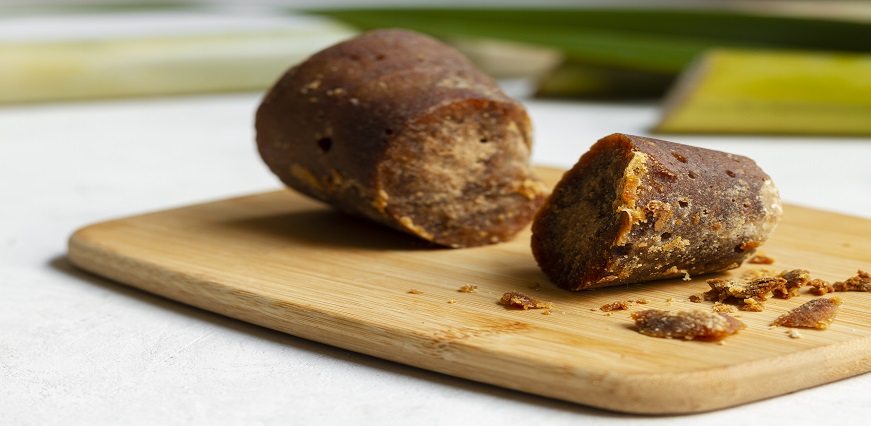





No lab centers are available in this city

Max Lab
Jan 30, 2023
Jaggery, or unrefined cane sugar, has been used for thousands of years in India. It is made from the sap of sugarcane and is considered to be a type of natural sweetener. While it may not have the same sweetness as white sugar, its health benefits are nonetheless well-known and valued by many cultures. In this blog article, we’ll explore the various health benefits of jaggery as well as its side effects. We will also take a look at how you can use jaggery in your daily meals and recipes.
Jaggery is a form of unprocessed sugar. Because the nutrient-rich molasses is not spun out of the sugar during processing, it is occasionally referred to as a "non-centrifugal sugar."
It is often used in Asian and African cooking as a sweetener. Jaggery has a strong, molasses-like flavor and is darker in color than regular sugar.
Health benefits of jaggery include its ability to cleanse the body, act as a digestive aid, and boost immunity. Additionally, jaggery can help increase hemoglobin levels, treat respiratory problems, and improve skin health. However, jaggery also has some side effects, such as increasing risk for tooth decay and promoting weight gain. Therefore, it is important to consume jaggery in moderation.
Jaggery is a type of unrefined, whole sugar made from cane juice and date palm sap. It has a brownish-black color and a toffee-like flavor and is used as a sweetener in many Asian countries.
There are two types of jaggery: cane jaggery and palm jaggery. Both are made by boiling down sugar cane or palm sap until it solidifies. Cane jaggery is made from sugar cane juice while palm jaggery is made from the sap of certain palms, such as the date palm or the palmyra palm.
The main difference between these two types of jaggery is their taste and color. Palm jaggery has a more intense flavor and darker color than cane jaggery. It also contains more nutrients, such as iron and calcium.
Jaggery can be used in many different ways, including in baking, cooking, and making drinks. It can be added to tea or coffee to give it a sweetness and richness, or used in savory dishes to add depth of flavor. Jaggery can also be used as a natural alternative to white sugar.
Jaggery retains many of the molasses and other nutrients present in cane juice, making it a nutrient-rich sweetener. Jaggery has been traditionally used in Ayurvedic medicine for its health benefits.
Some of the potential health benefits of jaggery include:
1. Digestive Health: Jaggery can help to stimulate digestion and prevent constipation. It is a good source of dietary fiber, which can help to keep the digestive system healthy. Jaggery also contains several minerals that are essential for gut health, including magnesium, potassium, and iron.
2. Weight Loss: Jaggery is lower in calories than refined sugar and may help with weight loss. Additionally, jaggery can help to regulate blood sugar levels, which may also aid in weight loss.
3. Immunity: Jaggery contains antioxidants that can help to boost immunity and protect against infections and diseases. The vitamin C content in jaggery also helps to reduce inflammation throughout the body.
4. Respiratory Health: Jaggery has anti-inflammatory properties that can help to ease respiratory conditions like bronchitis and asthma. The expectorant properties of jaggery can also help to clear congestion and phlegm from the chest and throat.
5. Skin Health: Jaggery is rich in vitamins and minerals that are essential for skin health, including zinc, calcium,
Jaggery is a good source of energy and has been traditionally used to treat anemia. It is also used as a sweetener in Ayurvedic medicine.
However, jaggery also has some side effects. Consuming too much jaggery can lead to weight gain, so it should be eaten in moderation. Jaggery can also cause diarrhea and abdominal pain if consumed in large amounts. It is also not recommended for people with diabetes or those who are trying to lose weight.
Jaggery is popular in Asia and Africa and is used in both sweet and savory dishes.
It has a unique flavor and is used in many traditional dishes. Here are some of the most popular uses for jaggery:
1. Jaggery can be used as a natural sweetener in place of refined sugar.
2. It adds a unique flavor to Indian desserts and curries.
3. Jaggery is believed to have health benefits, such as aiding digestion and boosting energy levels.
4. Jaggery can be used in making chutneys, jams, and other preserves.
5. It can also be candied or made into syrup.
Jaggery has many health benefits due to its high nutritional content. It is a good source of iron, magnesium, potassium, and vitamin C. Jaggery also contains antioxidants and has been shown to boost immunity. Additionally, jaggery can help improve digestion, relieve constipation, and regulate blood sugar levels.
With our offerings in line with government-mandated prices, Maxlab offers full body checkup packages that cover an exhaustive list of tests for a comprehensive diagnosis of your health. Choose from a range of health test packages based on your needs.
In conclusion, jaggery is a great alternative to white sugar and it has many health benefits. It helps to regulate the digestive system, strengthens immunity, and can even help with weight loss. However, moderation is key when consuming jaggery as too much of anything can be bad for your health. Be sure to consume this sweetener in moderation and know about any potential side effects that could occur before adding it to your diet.
Jaggery, also known as "gur" in Hindi, is a natural sweetener that has been used for centuries across South Asia and beyond. It is made by boiling raw sugar cane juice or palm sap until it solidifies into a dense, golden-brown block of goodness.
One of the main concerns with consuming excessive amounts of jaggery is weight gain. Jaggery is high in calories and sugar content, so overindulging can lead to unwanted weight gain and increase the risk of obesity-related health problems.
One such instance is in the morning. Starting your day with a small piece of jaggery can help kickstart your metabolism and provide you with an energy boost. It also aids digestion and helps cleanse your system, setting a positive tone for the rest of the day.
The answer is yes, jaggery can change color over time. When freshly made, jaggery is usually dark brown in color and has a rich molasses-like flavor. However, as it ages, the color of jaggery can gradually lighten or darken depending on various factors such as storage conditions and exposure to air.
Jaggery contains several essential vitamins and minerals that are beneficial for our overall health. One notable vitamin found in jaggery is vitamin B complex, which includes thiamine (B1), riboflavin (B2), niacin (B3), pyridoxine (B6), and folate (B9).
To maximize the benefits of jaggery without risking any adverse effects on the skin or overall health, it is advisable to consult with a healthcare professional or nutritionist who can guide you based on your specific needs.












Sign up takes less than 60 secs and gives you access to your offers, orders and lab tests.
Looks like you are not registered with us. Please Sign up to proceed
OTP will be sent to this number by SMS
We have successfully received your details. One of the agents will call you back soon.
 To reach our help desk call 9213188888
To reach our help desk call 9213188888
No Lab Centers are available in this city
Looks like you are not registered with us. Please Sign up to proceed
OTP will be sent to this number by SMS
Not Registered Yet? Signup now.Looks like you are not registered with us. Please Sign up to proceed






.png)
Comments